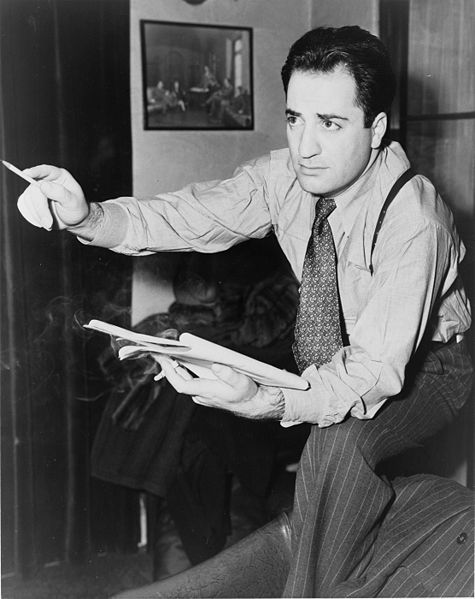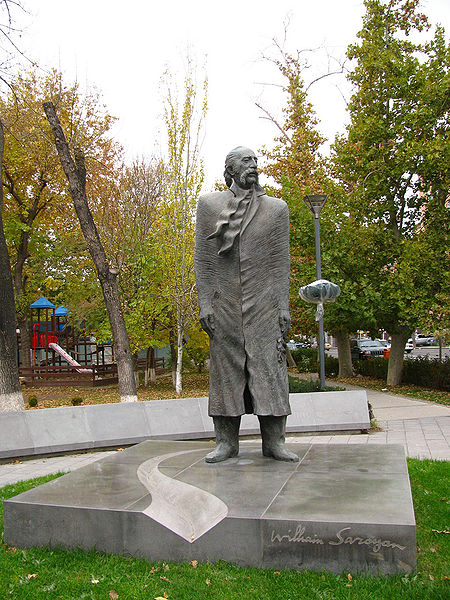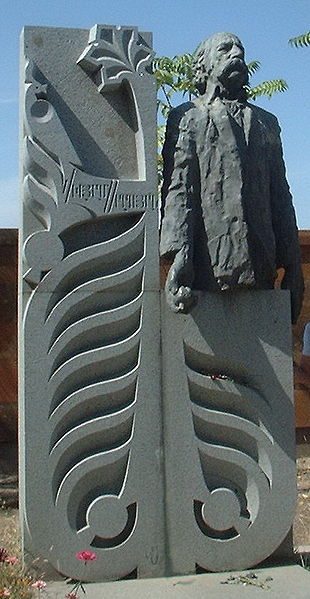<Back to Index>
- Chemist Friedrich Adolf Paneth, 1887
- Author William Saroyan, 1908
- Taishō Emperor of Japan Yoshihito, 1879


William Saroyan (Armenian: Վիլյամ Սարոյան; 31 August 1908 - 18 May 1981) was an Armenian-American dramatist and author. The setting of many of his stories and plays is the center of Armenian-American life in California in his native Fresno.
Saroyan was born in Fresno, California, to Armenian immigrants from Bitlis in the Ottoman Empire (now Turkey). At the age of three, after his father's death, Saroyan was placed in the orphanage in Oakland, California, together with his brother and sister, an experience he later described in his writing. Five years later, the family reunited in Fresno, where his mother, Takoohi, secured work at a cannery. He continued his education on his own, supporting himself by taking odd jobs, such as working as an office manager for the San Francisco Telegraph Company.
Saroyan
decided to become a writer after his mother showed him some of his
father's writings. A few of his early short articles were published in Overland Monthly.
His first stories appeared in the 1930s. Among these was "The Broken
Wheel", written under the name Sirak Goryan and published in the
Armenian journal Hairenik in 1933. Many of Saroyan's stories were based on his childhood experiences among the Armenian-American fruit growers of the San Joaquin Valley, or dealt with the rootlessness of the immigrant. The short story collection My Name is Aram (1940), an international bestseller, was about a young boy and the colorful
characters of his immigrant family. It has been translated into many
languages. As a writer Saroyan made his breakthrough in Story magazine with The Daring Young Man on the Flying Trapeze (1934), the title taken from the nineteenth century song of the same title. The protagonist is a young, starving writer who tries to survive in a Depression-ridden society. Saroyan served in the US Army during World War II. He was stationed in Astoria, Queens,
spending much of his time at the Lombardy Hotel in Manhattan, far from
Army personnel. In 1942, he was posted to London as part of a film
unit. He narrowly avoided a court martial when his novel, The Adventures of Wesley Jackson, was seen as advocating pacifism. Saroyan
worked rapidly, hardly editing his text, and drinking and gambling away
much of his earnings. From 1958 on, he mainly resided in a Paris
apartment. Saroyan
published essays and memoirs, in which he depicted the people he had
met on travels in the Soviet Union and Europe, such as the playwright George Bernard Shaw, the Finnish composer Jean Sibelius, and Charlie Chaplin. In 1952, Saroyan published The Bicycle Rider in Beverly Hills, the first of several volumes of memoirs. Saroyan's stories celebrated optimism in the midst of the trials and tribulations of the Depression. Several of Saroyan's works were drawn from his own experiences, although his approach to autobiographical fact contained a fair bit of poetic license. His
advice to a young writer was: "Try to learn to breathe deeply; really
to taste food when you eat, and when you sleep really to sleep. Try as
much as possible to be wholly alive with all your might, and when you
laugh, laugh like hell." Saroyan endeavored to create a prose style
full of zest for life and seemingly impressionistic, that came to be
called "Saroyanesque". In some respects, Saroyan's characters resemble the penniless writer in Knut Hamsun's 1890 novel Hunger,
but lack the anger and nihilism of Hamsun's narrator. The royalties from a collection of stories enabled Saroyan to travel
to Europe and Armenia, where he learned to love the taste of Russian
cigarettes, once observing, "you may tend to get cancer from the thing
that makes you want to smoke so much, not from the smoking itself."
(from Not Dying, 1963) Saroyan's
plays were drawn from deeply personal sources, and often disregarded
the convention that conflict is essential to drama. My Heart's in the Highlands (1939),
his first play, was a comedy about a young boy and his Armenian family.
It was produced at the Guild Theatre in New York. Saroyan is probably best remembered for his play The Time of Your Life (1939), set in a waterfront saloon in San Francisco. It won a Pulitzer Prize, which Saroyan refused on the grounds that commerce should not judge the arts; he did accept the New York Drama Critics' Circle award. The play was adapted into a 1948 film starring James Cagney. Before the war, Saroyan worked on the screenplay of Golden Boy (1939), based on Clifford Odets's play, but he never had much success in Hollywood and after his disappointment with the Human Comedy film project, he never permitted any Hollywood screen adaptation of any of his novels regardless of his financial straits. The Human Comedy (1943) is set in the fictional California town of Ithaca in the San Joaquin Valley (based on Saroyan's memories of Fresno, California), where young telegraph messenger Homer bears witness to the sorrows and joys of life during World War II. Interest
in Saroyan's novels declined after the war, when he was criticized for
sentimentality. Freedom, brotherly love, and universal benevolence were
for him basic values, but his idealism was considered out of step with
the times. He still wrote prolifically, so that one of his readers
could ask "How could you write so much good stuff and still write such
bad stuff?" In the novellas The Assyrian and other stories (1950) and in The Laughing Matter (1953) Saroyan mixed allegorical elements within a realistic novel. The plays Sam Ego's House (1949) and The Slaughter of the Innocents (1958) were not as successful as his prewar plays. Many of Saroyan's later plays, such as The Paris Comedy (1960), The London Comedy (1960), and Settled Out of Court (1969), premiered in Europe. Manuscripts of a number of unperformed plays are now at Stanford University with his other papers. When Ernest Hemingway learned that Saroyan had made fun of the controversial non-fiction work Death in the Afternoon, Hemingway responded: "We've seen them come and go. Good ones too. Better ones than you, Mr. Saroyan." In the late 1960s and the 1970s, Saroyan earned more money and finally got out of debt. In 1943, Saroyan was married to actress Carol Marcus (1924-2003) with whom he had two children, Aram and Lucy. Aram went on to become an author, and published a book about his father, and Lucy was an actress. By
the late 1940s, Saroyan's drinking and gambling took a toll on his
marriage, and he filed for divorce upon returning from an extended
European trip in 1949. They were remarried briefly in 1951 and divorced
again in 1952 with Marcus later claiming in her autobiography, Among the Porcupines: A Memoir, that Saroyan was abusive. Carol was subsequently married to actor Walter Matthau. Saroyan died in Fresno, of prostate cancer at age 72. Half of his ashes were buried in California, and the remainder in Armenia at the Pantheon near film director Sergei Parajanov.
Saroyan was hired to write the screenplay for and direct the film for MGM. When Louis B. Mayer balked
at its length, Saroyan would not compromise and was removed from the
project. He then turned the script into a novel, publishing it just
prior to the film's release. This novel is often credited as the source
for the movie when in fact the reverse is true. The novel is the basis
for a 1983 musical of the same name.“ "Mrs.
Sandoval," Homer said swiftly, "your son is dead. Maybe it's a mistake.
Maybe it wasn't your son. Maybe it was somebody else. The telegram says
it was Juan Domingo. But maybe the telegram is wrong... (from The Human Comedy) ”


